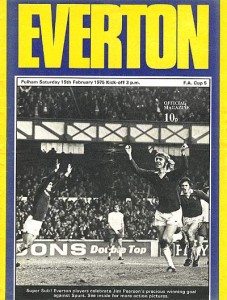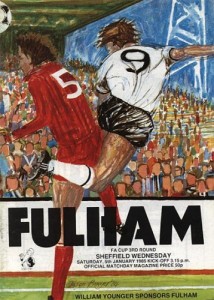Book Review: With Clough, By Taylor (with Mike Langley)
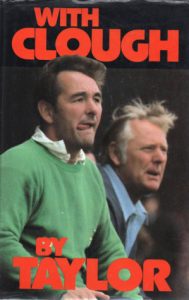 This book was originally published in October 1980 (cover right), and at that time the Clough and Taylor partnership was still going strong, with Nottingham Forest having collected a second European Cup triumph following a 1-0 win over a Hamburg side in Madrid containing Kevin Keegan. Within two years Peter Taylor resigned from Forest and took up the management of rivals Derby County from November 1982 to April 1984 and it was during this period that he and Brian Clough fell out, never to reconcile before Taylor’s death in October 1990 of pulmonary fibrosis while on holiday in Mallorca, at the age of just 62. This republishing of With Clough, By Taylor (cover below left) is sold with royalties donated to Action for Pulmonary Fibrosis (www.actionpulmonaryfibrosis.org)
This book was originally published in October 1980 (cover right), and at that time the Clough and Taylor partnership was still going strong, with Nottingham Forest having collected a second European Cup triumph following a 1-0 win over a Hamburg side in Madrid containing Kevin Keegan. Within two years Peter Taylor resigned from Forest and took up the management of rivals Derby County from November 1982 to April 1984 and it was during this period that he and Brian Clough fell out, never to reconcile before Taylor’s death in October 1990 of pulmonary fibrosis while on holiday in Mallorca, at the age of just 62. This republishing of With Clough, By Taylor (cover below left) is sold with royalties donated to Action for Pulmonary Fibrosis (www.actionpulmonaryfibrosis.org)
 Given this is a republishing almost forty-years later, the reader has the benefit of all the events post the original release in 1980 and therefore makes it a different read. For instance, back then any reader, given what the pair had achieved up to that point, might have comfortably assumed that there were more years of success to follow, whereas in fact within two years Clough and Taylor were no longer a partnership. And in some ways, it is interesting to see this reflected in the two covers from 1980 and the 2019 publications. The 80s version has the men together deep in concentration, focused on the action in front of them, whereas the latest edition sees them sat before the start of the 1980 European Cup Final, seemingly together but portraying a distance as well. It may simply be that they are nervous ahead of such a major game, or that they are uncomfortable with the intrusive nature of the photographers. However, given that the pair never reconciled after their row surrounding the John Robertson transfer, the current image may well have been chosen to reflect the split.
Given this is a republishing almost forty-years later, the reader has the benefit of all the events post the original release in 1980 and therefore makes it a different read. For instance, back then any reader, given what the pair had achieved up to that point, might have comfortably assumed that there were more years of success to follow, whereas in fact within two years Clough and Taylor were no longer a partnership. And in some ways, it is interesting to see this reflected in the two covers from 1980 and the 2019 publications. The 80s version has the men together deep in concentration, focused on the action in front of them, whereas the latest edition sees them sat before the start of the 1980 European Cup Final, seemingly together but portraying a distance as well. It may simply be that they are nervous ahead of such a major game, or that they are uncomfortable with the intrusive nature of the photographers. However, given that the pair never reconciled after their row surrounding the John Robertson transfer, the current image may well have been chosen to reflect the split.
Of the content of the book itself, it follows a fairly chronological line of their time together and apart, starting with the initial meeting as players at Middlesbrough, where Taylor was a goalkeeper and Clough a centre-forward. It then documents their first managerial job at Hartlepools United, the triumph, trials and tribulations at Derby County, the time at Brighton & Hove Albion together and then with Taylor solely in charge and finally their tenure at Nottingham Forest. These parts of the book all feel fairly understated and it is not until Taylor comes onto other topics, in particular, Clough’s 44 days at Leeds United, Taylor’s views on the England team and the players in the game that he admired, that as a reader we get to see an animated side of his character and get to read about Taylor’s undoubted understanding of players and their respective talents.
That Clough and Taylor were two different characters is reflected in the number of books about Clough, given the persona he portrayed to the world and his penchant for the outspoken and controversial, as the paucity of titles about Peter Taylor, who admitted himself, was uncomfortable in front of the media. The fact is that the pair were highly successful, and their different personalities and skills ensured that, as Clough acknowledged, “I’m not equipped to manage successfully without Peter Taylor. I am the shop window and he is the goods in the back.”
The ending of the book is on reflection a sad footnote, with Taylor stating, “Both of us are aware that it (our partnership) cannot last for ever and that we must part again one day. I hope we part on a high note and on the friendliest terms, and that football will remember us as pioneers of management – the first to see that two heads are better than one.” Clough and Taylor will always be remembered as a unique and successful partnership and indeed will always be part of football history and folklore, the pity though is that their friendship never had that chance of a final reconciliation.
(Biteback Publishing, 24 Jan. 2019. Paperback 288pp)

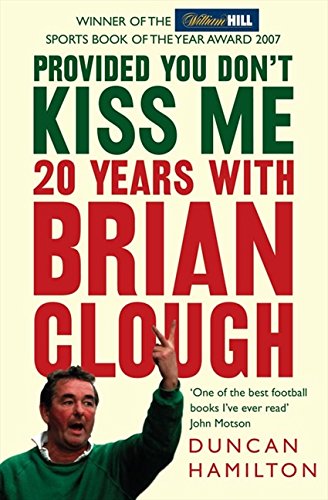
 In other books within this Amberley series the subject has either been a legendary player or a manager, but in this edition the focus is on Brian Clough who it could be argued is a rarity in having an extraordinary career in both areas of the game.
In other books within this Amberley series the subject has either been a legendary player or a manager, but in this edition the focus is on Brian Clough who it could be argued is a rarity in having an extraordinary career in both areas of the game. When writing about the history of Nottingham Forest, it is easy to focus on the period of success experienced under the management of Brian Clough; a time when you would seemingly wait a couple of seasons for an open-top bus tour of the Market Square then two would come along in quick succession. But there is more to Nottingham Forest than this – a history of otherwise infrequent success and near misses, along with early innovation, proceeded Clough’s appointment and that fateful day of 6 January 1975 is not reached until page 164 of this book.
When writing about the history of Nottingham Forest, it is easy to focus on the period of success experienced under the management of Brian Clough; a time when you would seemingly wait a couple of seasons for an open-top bus tour of the Market Square then two would come along in quick succession. But there is more to Nottingham Forest than this – a history of otherwise infrequent success and near misses, along with early innovation, proceeded Clough’s appointment and that fateful day of 6 January 1975 is not reached until page 164 of this book. It is twenty five years since the Hillsborough disaster and this year saw the beginning of fresh inquests after the original hearings were quashed. Of course the 96 victims who died and the hundreds injured in the tragedy, along with their friends and families have been the ones who have suffered the greatest loss and pain as a result of the events of 15 April 1989 in Sheffield. However, there is also another set of people who have had to deal with what they witnessed that day. These include all those who attended the game that day.
It is twenty five years since the Hillsborough disaster and this year saw the beginning of fresh inquests after the original hearings were quashed. Of course the 96 victims who died and the hundreds injured in the tragedy, along with their friends and families have been the ones who have suffered the greatest loss and pain as a result of the events of 15 April 1989 in Sheffield. However, there is also another set of people who have had to deal with what they witnessed that day. These include all those who attended the game that day. When England manager Roy Hodgson recently suggested that he would be monitoring the progress of Manchester United’s Belgian youngster Adnan Januzaj, the issue of international player eligibility was once more in the news.
When England manager Roy Hodgson recently suggested that he would be monitoring the progress of Manchester United’s Belgian youngster Adnan Januzaj, the issue of international player eligibility was once more in the news.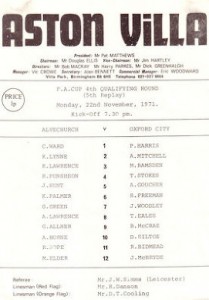 For me the reasons for the change in perspective of the FA Cup lay across the football community. The FA itself is complicit in damaging the competition in a number of ways. Firstly, there was the decision to allow Manchester United to opt out of the 1999/2000 FA Cup to take part in the revamped World Club Competition. This decision was part of the political gamble by the FA at the time, as they tried to sway FIFA in awarding England the hosting of the 2006 World Cup. And we all know how that worked out. Secondly, there was the ruling to have ties settled after a single replay (excluding the Semi-Final and Final itself). Personally, a major part of the glamour and thrill of the Cup was the odd occasions when a particular tie within a round went to a number of replays. As a Fulham fan I remember vividly the 1974/75 Cup run when we played Hull City three times to get through the Third Round and Nottingham Forest an incredible four times to make it through the Fourth Round. However, those Fulham fixtures were nothing compared to the record breaking fixture in 1971/72. Alvechurch played Oxford City in the 4th Qualifying Round. It required six games before Alvechurch emerged 1-0 winners. Sadly epic battles like that are a thing of the past. Thirdly, because of the burden of rebuilding Wembley Stadium, Semi-Finals now take place at the famous ground. This in my opinion also works to devalue the competition as the act of making it to Wembley and the Final are cheapened. Reaching a Final should be special. Certainly for me in 1975 seeing Fulham in the Final (despite defeat) was and is a treasured memory.
For me the reasons for the change in perspective of the FA Cup lay across the football community. The FA itself is complicit in damaging the competition in a number of ways. Firstly, there was the decision to allow Manchester United to opt out of the 1999/2000 FA Cup to take part in the revamped World Club Competition. This decision was part of the political gamble by the FA at the time, as they tried to sway FIFA in awarding England the hosting of the 2006 World Cup. And we all know how that worked out. Secondly, there was the ruling to have ties settled after a single replay (excluding the Semi-Final and Final itself). Personally, a major part of the glamour and thrill of the Cup was the odd occasions when a particular tie within a round went to a number of replays. As a Fulham fan I remember vividly the 1974/75 Cup run when we played Hull City three times to get through the Third Round and Nottingham Forest an incredible four times to make it through the Fourth Round. However, those Fulham fixtures were nothing compared to the record breaking fixture in 1971/72. Alvechurch played Oxford City in the 4th Qualifying Round. It required six games before Alvechurch emerged 1-0 winners. Sadly epic battles like that are a thing of the past. Thirdly, because of the burden of rebuilding Wembley Stadium, Semi-Finals now take place at the famous ground. This in my opinion also works to devalue the competition as the act of making it to Wembley and the Final are cheapened. Reaching a Final should be special. Certainly for me in 1975 seeing Fulham in the Final (despite defeat) was and is a treasured memory.